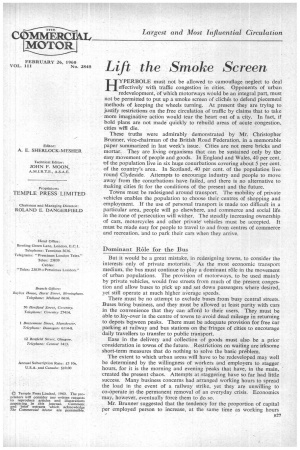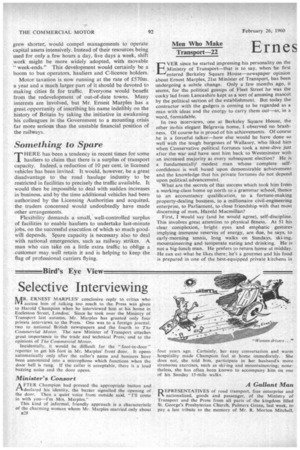Lift the Smoke Screen
Page 141

Page 142

If you've noticed an error in this article please click here to report it so we can fix it.
HYPERBOLE must not be allowed to camouflage neglect to deal effectively with traffic congestion in cities. Opponents of urban redevelopment, of which motorways would be an integral part, must not be permitted to put up a smoke screen of cliches to defend piecemeal methods of keeping the wheels turning. At present they are trying to justify restrictions on the free circulation of traffic by claims that to take more imaginative action would tear the heart out of a city. In fact, if bold plans are not made quickly to rebuild areas of acute congestion, cities will die.
These truths were admirably demonstrated by Mr. Christopher Brunner, vice-chairman of the British Road Federation, in a memorable paper summarized in last week's issue. Cities are not mere bricks and mortar. They are living organisms that can be sustained only by the easy movement of people and goods. In England and Wales, 40 per cent. of the population live in six huge conurbations covering about 5 per cent. of the country's area. In Scotland, 40 per cent, of the population live round Clydeside. Attempts to encourage industry and people to move away from the conurbations have failed, and there is no alternative to making cities fit for the conditions of the present and the future.
Towns must be redesigned around transport. The mobility of private vehicles enables the population to choose their centres of shopping and employment. If the use of personal transport is made too difficult in a particular area, people will go elsewhere, and commerce and social life in the zone of persecution will wither. The steadily increasing ownership of cars, motorcycles and other private vehicles must be accepted. It must be Made easy for people to travel to and from centres of commerce and recreation, and to park their cars when they arrive.
Dominant Role for the Bus But it would be a great mistake, in redesigning towns, to consider the interests only of private motorists. As the most economic transport medium, the bus must continue to play a dominant role in the movement of urban populations. The provision of motorways, to be used mainly by private vehicles, would free streets from much of the present congestion and allow buses to pick up and set down passengers where desired, yet still operate at much higher average speeds.
There must be no attempt to exclude buses from busy central streets. Buses bring business, and they must be allowed at least parity with cars in the convenience that they can afford to their users. They must be able to lay-over in the centre of towns to avoid dead mileage in returning to depots between peaks. There must be adequate provision for free car parking at railway and bus stations on the fringes of cities to encourage daily travellers to transfer to public transport.
Ease in the delivery and collection of goods must also be a prior consideration in towns of the future. Restrictions on waiting are irksome short-term measures that do nothing to solve the basic problem.
The extent to which urban areas will have to be redeveloped may well be determined by the willingness of workers and employers to stagger hours, for it is the morning and evening peaks that have, in the main, created the present chaos. Attempts at staggering have so far had little success. Many business concerns had arranged working hours to spread the load in the event of a railway strike, yet they are unwilling to co-operate in the permanent removal of an everyday crisis. Economics may, however, eventually force them to do so.
Mr. Brunner suggested that the tendency for the proportion of capital per employed person to increase, at the same time as working hours »27 grew shorter, would compel managements to operate capital assets intensively. Instead of their resources being used for only a few hours a day, five days a week, shift work might be more widely adopted, with movable "week-ends." This development would certainly be a boom to bus operators, hauliers and C-licence holders.
Motor taxation is now running at the rate of £370m. a year and a much larger part of it should be devoted to making cities fit for traffic. Everyone would benefit from the redevelopment of out-of-date towns. Many interests are involved, but Mr. Ernest Marples has a great opportunity of inscribing his name indelibly on the history of Britain by taking the initiative in awakening his colleagues in the Government to a mounting crisis far more serious than the unstable financial position of the railways.
Something to Spare
F-1-I HERE has been a tendency in recent times for some 1 hauliers to claim that there is a surplus of transport capacity. Indeed, a reduction of 10 per cent. in licensed vehicles has been invited. It would, however, be a great disadvantage to the road haulage industry to be restricted in facilities to precisely the traffic available. It would then be impossible to deal with sudden increases in business, and by the time additional vehicles had been authorized by the Licensing Authorities and acquired, the traders concerned would undoubtedly have made other arrangements.
Flexibility demands a small, well-controlled surplus of facilities to enable hauliers to undertake last-minute jobs, on the successful execution of which so much goodwill depends. Spare capacity is necessary also to deal with national emergencies, such as railway strikes. A man who can take on a little extra traffic to oblige a customer may well retain it and is helping to keep the flag of professional carriers flying.
























































































































































































































